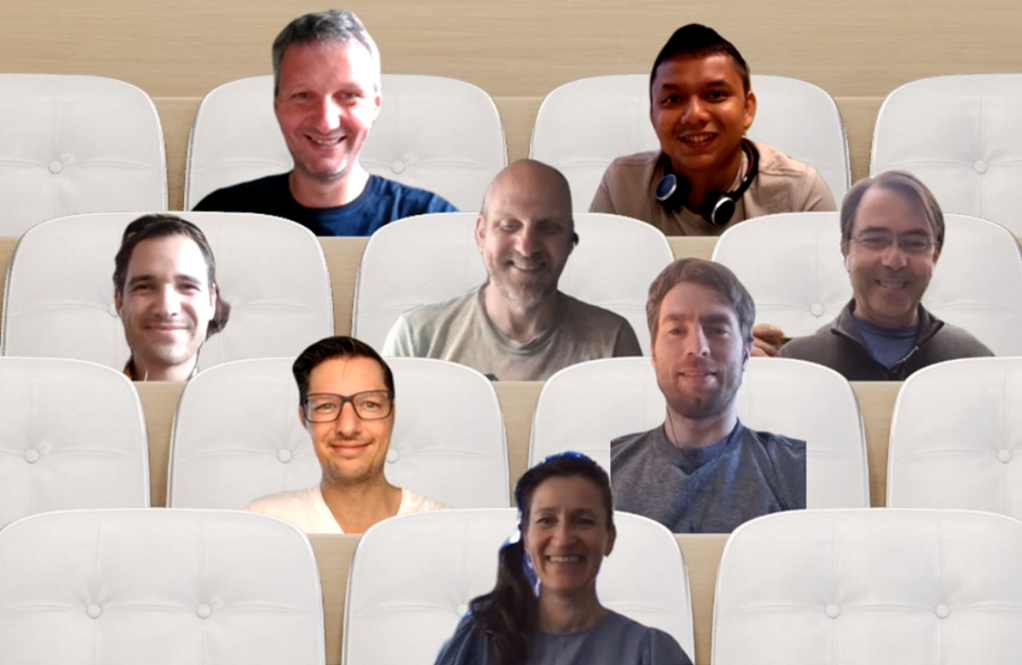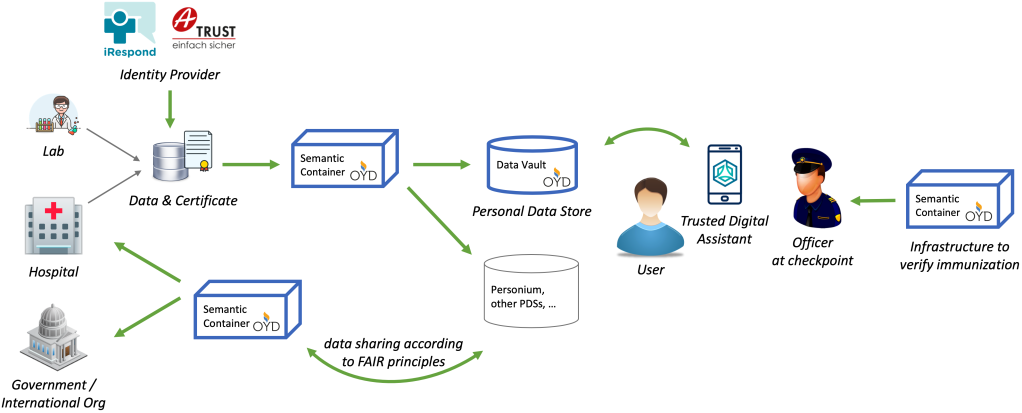by DIP – Digital Immunization Passport team

The Challenge
For decades, governments and health organisations have struggled to digitise health passports and establish secure and trustworthy data exchange between citizens and health institutions. The problems are manifold, but recent developments in identity and credential management and upcoming legislation in data governance enable and require new solutions. For individual people there have been the challenges of sharing their health data from various sources and presenting them in a way which does not unnecessarily compromise their personal data.
The Solution
Based on self-sovereign identity and MyData principles, we showcased a human-centric model to manage an individual’s vaccination status in accordance with NGI’s 8 human-centric goals. Specifically, we developed solutions for organisations to create and verify health credentials and share traceable data securely with institutions. Organisations use Semantic Containers to have all required functionality within a single package, and individuals use the OwnYourData Data Vault as their Personal Data Store. Most importantly, however, was using open standards for data exchange to guarantee interoperability with no vendor lock-in for any of the used components.
DAPSI support
NGI DAPSI provided an excellent framework for us to deliver the goals set out in our initial proposal. Coaching sessions provided guidance and balanced technical and business aspects for our prototype deliverables. After the first five months, competing against the other funded projects provided a significant milestone and benchmark to complete the Proof-of-Concept. In addition, the positive momentum of being selected to continue to phase 2 allowed us to refine our solution further and gather more feedback.
DAPSI journey – Achievements from first phase of the DAPSI programme
We designed and implemented digital vaccination records and data exchange in a decentralised and human-centric way. A particular focus was on business, legal and societal aspects when deploying this new technology in a multi-governance environment.
We achieved the project goal by providing a prototype for an end-to-end vaccine data portability built on three core components: Semantic Containers, OwnYourData Data Vault, and Trusted Digital Assistant – all operating within a semantic architecture for data harmonisation.
A video with a short description of developed components and implemented dataflows is presented below.
The project will be integrated with international initiatives and is represented, for example, at Linux Foundation Public Health.
DAPSI journey – Achievements from second phase of the DAPSI programme
During the second phase of the DAPSI programme, our focus was on stabilising the existing prototype and extending functionality to allow for more general use cases. An example is the inclusion of stepwise vaccination with booster shots and multi-user management for clinics and checkpoints. During this time, we were able to onboard two additional team members at OwnYourData and focus on Linked Data and RDF data structure. Business-wise we received a Letter of Support from both the humanitarian sector and one of the largest pharmaceutical companies.
A significant step was creating a dedicated demo system to showcase our prototype beyond the project milestones. OwnYourData looks forward to continuing our collaboration with the Human Colossus Foundation. In addition, we are delighted that a project proposal in Austria will be funded to further extend our prototype for integration with the IDunion project in Germany. The Human Colossus Foundation has introduced the DIP approach to COVID Credentials Initiative (CCI), a project hosted by Linux Foundation Public Health. Within the Good Health Pass Collaborative (GHPC), an initiative consisting of over 110 organisations, Overlays Capture Architecture (OCA) was proposed as a solution for semantic harmonisation between data models and data representation formats. Devised to enable data object interoperability and act as a catalyst for standardised credential issuance in multiple languages, OCA has been officially recommended in the GHP Interoperability Blueprint, published in June 2021 ahead of the G7 summit.
Lessons learnt
During the DAPSI project, we experienced many well-known project management pitfalls and were blessed to have a great team spirit to overcome them. It was essential to start with solid documentation (requirements and design) and then implement and integrate functionalities in a stepwise approach. We learned the importance of a stable system for integration and testing and set up weekly sync meetings to keep everyone on the same page. Unfortunately, due to the COVID-19 pandemic, there were no in-person meetings during the project, and some members still only know each other from Zoom meetings.
We received confirmation that our solution is on point with current self-sovereignty and data governance developments. We reached many people through coaching sessions provided by DAPSI and other Meetups and community gatherings (e.g., MyData or Linux Foundation Public Health). From ‘very encouraging’ to ‘particularly challenging’, we received feedback that will enhance opportunities to develop our project further.
What’s next
For OwnYourData, Data Sovereignty will be an integral focus in upcoming projects, especially health passports. However, several practical challenges need to be solved before these solutions can become mainstream. A concrete next step will be an FFG-funded project starting in August 2021 to integrate our solution with IDunion in Germany, a new Hyperledger Indy-based network.
The DIP project confirmed the viability of the Human Colossus Foundation’s vision of a Dynamic Data Economy, demonstrating safe and secure peer-to-peer data exchange for a next-generation Internet. In addition, DIP showed how a human-centric approach solves interoperability issues when transporting sensitive data in a decentralised ecosystem. In response to the specific demands of the health care sector, the HCF founders are currently creating a commercial entity for the continued evolution of these solutions in a pharmaceutical and health industry-specific context.


